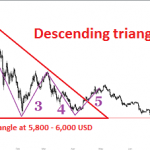The Conference Board Leading Economic Index (LEI) for the U.S. marginally declined this month – but the authors believe the outlook “still suggests economic expansion will continue”.

This index is designed to forecast the economy six months in advance. The market (from Bloomberg) expected this index’s month-over-month change at -0.2 % to 0.2 % (consensus 0.0%) versus the -0.2 % reported.
ECRI’s Weekly Leading Index (WLI) is forecasting very slow or possible negative growth over the next six months.
Additional comments from the economists at The Conference Board add context to the index’s behavior.
The Conference Board Leading Economic Index® (LEI) for the U.S. declined 0.2 percent in September to 123.3 (2010 = 100). The Index was unchanged in August and July.
“Despite September’s decline, the U.S. LEI still suggests economic expansion will continue, although at a moderate pace,” said Ataman Ozyildirim, Director of Business Cycles and Growth Research at The Conference Board. “The recent weakness in stock markets, the manufacturing sector and housing permits was offset by gains in financial indicators, and to a lesser extent improvements in consumer expectations and initial claims for unemployment insurance. The U.S. economy is on track for moderate growth of about 2.5 percent in the coming quarters, despite the mixed global economic landscape.”
The Conference Board Coincident Economic Index® (CEI) for the U.S. increased 0.2 percent in September to 112.8 (2010 = 100), following a 0.1 percent increase in August, and a 0.3 percent increase in July.

z conference1.png
LEI as an Economic Monitoring Tool:
The usefulness of the LEI is not in the headline graphics but by examining its trend behavior. Econintersect contributor Doug Short (Advisor Perspectives / dshort.com) produces two trend graphics. The first one shows the six month rolling average of the rate of change – shown against the NBER recessions. The LEI has historically dropped below its six-month moving average anywhere between 2 to 15 months before a recession.














Leave A Comment